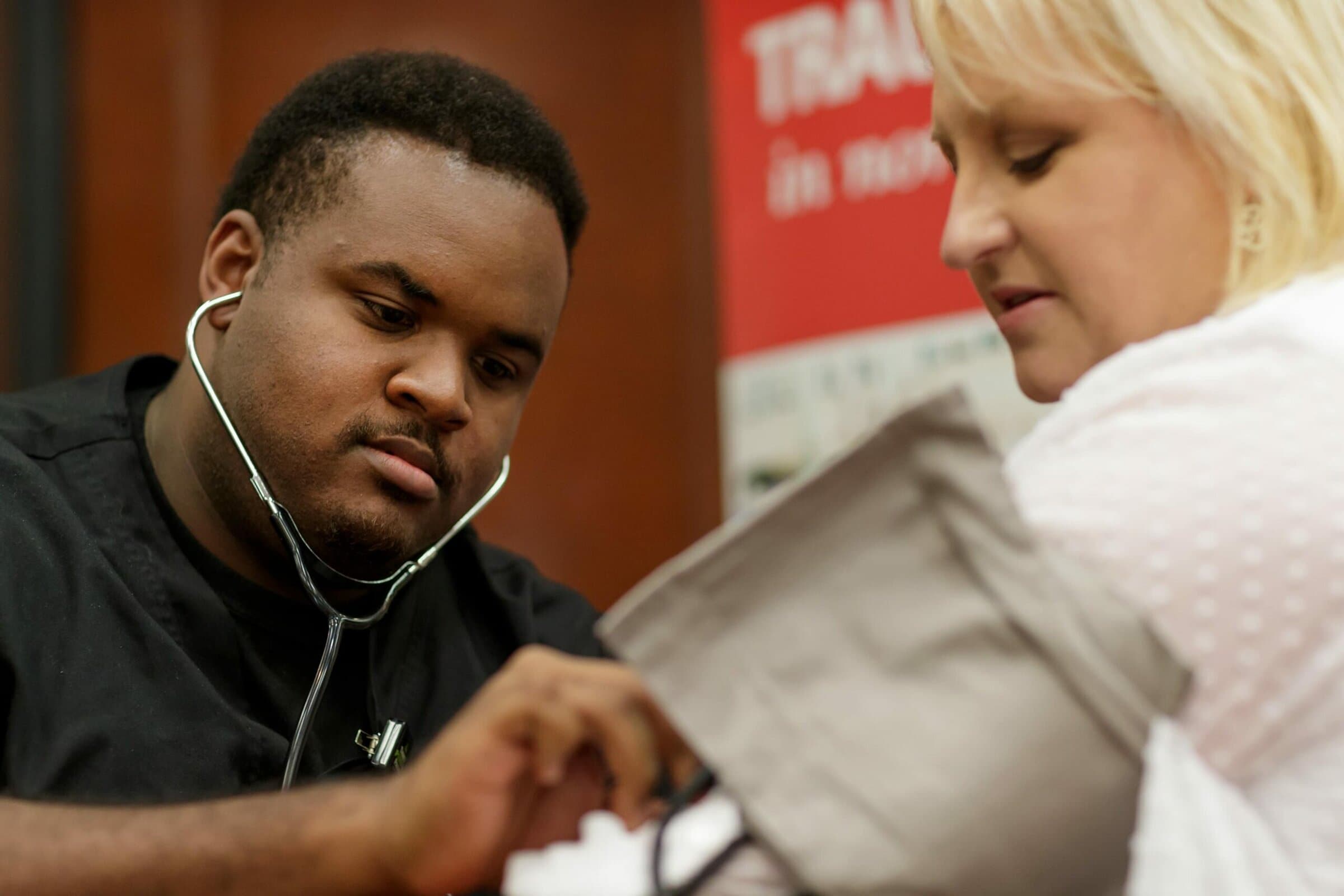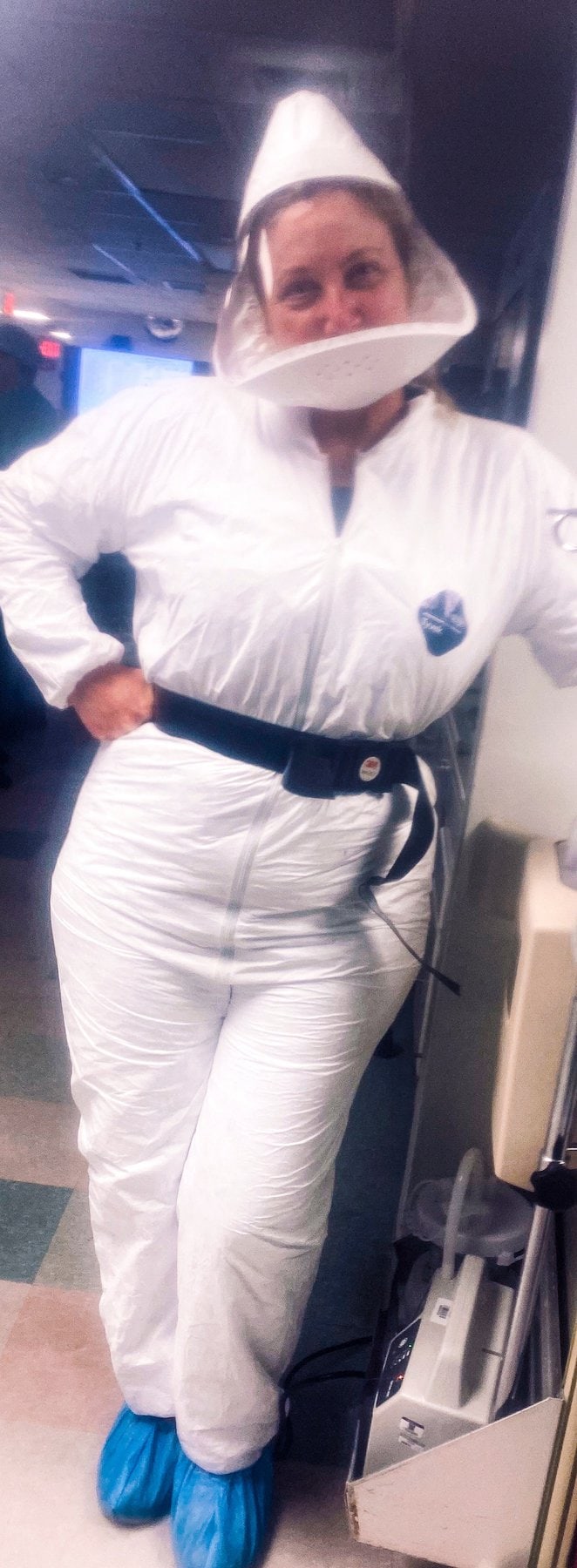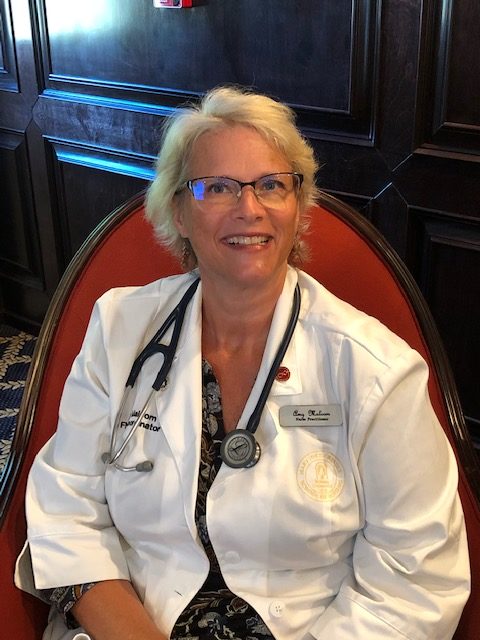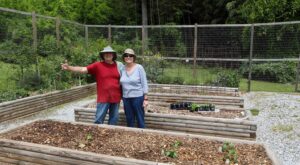

Since the novel coronavirus (COVID-19) outbreak, faculty, students and alumni of Brenau University’s Ivester College of Health Sciences have been on the front lines of the battle against the pandemic.
That includes Mary Inez Grindle School of Nursing graduate Martis Ferguson, BU ’19, an ICU nurse at Northeast Georgia Medical Center in Gainesville, Georgia.
Ferguson, who worked in patient logistics at NGMC for about five years before earning his Bachelor of Science in Nursing in May 2019, said the majority of his time in the ICU is spent caring for COVID-19 patients.
“It’s worse than the flu or pneumonia,” he said. “We’re constantly busy all the time. Patients either have or are recovering from COVID-19, or we’re ruling out COVID-19.”
Ferguson said he is grateful for NGMC’s concern not only for its patients but for employees as well, as the hospital has significantly increased its stockpile of personal protective equipment (PPE) like N-95 respirators, field shields and disposable full-body suits.
“They’re just trying to make us safer to help take care of these patients,” he said.
To further protect the safety of patients and the public, family members are not allowed to be with their sick loved ones face-to-face — which Ferguson called the most difficult part of his job. While family members and patients can FaceTime or Zoom with each other, Ferguson said it’s not the same.
“It’s very hard for the patients to FaceTime with family members and the family to know that they’re OK,” he said. “Sometimes a patient is asleep and their family can’t really talk to them. They’re just looking at them through a screen.”
Ferguson, a recipient of the Kay and Douglas Ivester Scholarship awarded annually to deserving health science majors, said he is thankful for the support of the Brenau community, including donations of PPE.

In late March, the Ivester College of Health Sciences donated hundreds of boxes of gloves, masks and N-95 respirators to Northeast Georgia Health System. The donation was organized by Heather Ross, chair of the Department of Physical Therapy, and her husband, Matt, a BSN student at Brenau and patient care tech at Northeast Georgia Medical Center.
“As our health system is working tirelessly to fight COVID-19, we are especially grateful for community partners like Brenau University,” said Carol Burrell, president and CEO of Northeast Georgia Health System. “We are most appreciative of their generous donation of PPE to protect our frontline staff and are proud to say that many of our staff are alumni, students and employees of Brenau.”
Gale Starich, dean of the Ivester College of Health Sciences and the Sidney O. Smith Graduate School, said that the faculty continues to hear regularly from nursing graduates like Ferguson and that “their spirits are high.”
“We in the Ivester College of Health Sciences remain more than appreciative of our BSN graduates who continue to address the critical needs of those with COVID-19,” she said. “They have felt prepared and supported by Brenau University faculty and colleagues.”
That preparation and support also extends to current students like Rhonda Haynes, who is working toward her acute care certification. As a critical care nurse practitioner at Phoebe Putney Memorial Hospital in Albany, Georgia, Haynes is responsible for providing medication, intubating patients, placing lines and other invasive measures.
“Whatever they need to try to help them get through this virus,” Haynes said. “A lot of it is supportive care. A lot of it is medications that we hope will work, but we still don’t have the studies to know for sure.”
Haynes, who has remained quarantined for over two months in a separate room to protect her family, said “it’s a scary time,” but she remains dedicated to helping patients while taking all the precautions she can to ensure their safety and her own.
However, she added that “in critical care, you can’t always save everyone.”
“When you’re intubating a patient, to have their last word be, ‘Save me and make me better,’ is one of the hardest things that I have faced,” Haynes said. “Or a family member of a patient saying, ‘Do everything you can to make them better.’ That takes a toll.”
Even for health care workers not interacting solely with infected patients, COVID-19 has impacted how they approach their daily tasks.
Carysa Mattlin, an assistant professor in Mary Inez Grindle School of Nursing at Brenau’s Norcross campus and a labor and delivery nurse at an Atlanta area hospital, said she never knows what she’s going to walk into when she goes to work.
“These women may have COVID-19 and be asymptomatic, as may their spouses. We cannot maintain a 6-foot distance from them. In fact, it is our job to come into direct physical contact with these women multiple times throughout our shift. We assess their progress, coach them through delivery, hold their hands, greet their new babies — none of this has changed.”

What has changed is the atmosphere, including pregnant women walking around the hospital while wearing protective face masks. Even worse, she said, is that women giving birth are only allowed one visitor for their entire stay — labor, delivery and postpartum — and no visitors under the age of 16 are allowed.
“I had a patient last week that had to deliver her baby without any family present because her mother’s flight was canceled, and she and her husband didn’t have anyone who could watch their other children during the birth,” Mattlin said. “It broke my heart.”
Despite the changes, Mattlin said one thing remains the same: “We have to care for them.”
Amy Malcom, assistant professor and family nurse practitioner program coordinator in Brenau’s Mary Inez Grindle School of Nursing, shares that same passion for care. As a family nurse practitioner herself at a busy rural practice in Madison, Georgia, she has seen some positive COVID-19 cases.
A so-called “Triple Tiger,” having earned her bachelor’s and master’s degrees in nursing and Doctor of Nursing Practice from Brenau, Malcom said her doctorate has helped her “be a true leader and evaluate organizational and global issues.” She is also grateful to be serving as a health care provider when they are needed most.
“I am here to support and serve my community,” Malcom said. “I have been a nurse for 29 years serving in intensive care and the emergency department. I am so happy to be in the office working as a provider. It is so rewarding.”
Starich praised the work of Mattlin and Malcom who “continue to lead our college by example.”
“While not directly working in COVID-19 ICUs, they serve at the forefront of this pandemic,” Starich said. “We could not be more proud of them.”

